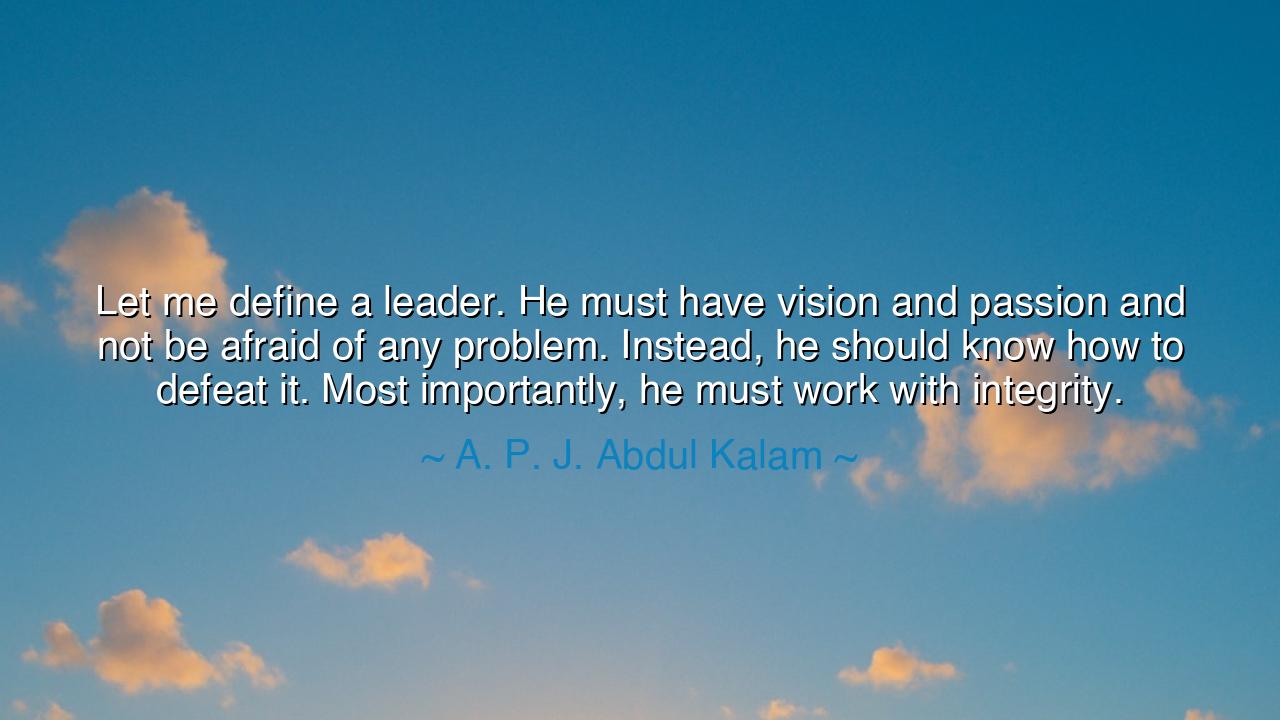
Let me define a leader. He must have vision and passion and not
Let me define a leader. He must have vision and passion and not be afraid of any problem. Instead, he should know how to defeat it. Most importantly, he must work with integrity.






In the timeless words of A. P. J. Abdul Kalam, “Let me define a leader. He must have vision and passion and not be afraid of any problem. Instead, he should know how to defeat it. Most importantly, he must work with integrity,” there lies the essence of noble leadership. A true leader is not merely one who commands, but one who sees beyond the present moment, who walks ahead as a beacon of hope for his people. His vision is the light that guides others through the shadows, and his passion is the fire that inspires them to rise above despair.
The origin of this truth is as ancient as the first tribes and kingdoms. In the olden days, a leader was chosen not for wealth or birthright alone, but for courage, wisdom, and the strength to protect his people. Great kings, sages, and warriors all understood that fear of problems breeds chaos, while courage to face and defeat them brings harmony. Kalam, like the philosophers of old, speaks not of mere political power, but of the eternal qualities that make a man worthy of trust and reverence.
To defeat a problem is not to strike blindly against it, but to understand its nature and overcome it with clarity and perseverance. A leader must be like the master of storms, knowing when to fight with the winds and when to sail with them. Yet above all, he must work with integrity, for without righteousness, his victories are hollow, and his followers will lose faith. Integrity is the root of all greatness, for it binds the leader’s heart to truth and justice.
Thus, these words are not mere advice but a sacred teaching. Let every soul who aspires to lead remember: vision without integrity is but illusion, and passion without righteousness becomes destruction. The path of leadership is a narrow bridge over the abyss of corruption and fear. Only by holding fast to integrity and walking with courage may one guide others safely across. In this way, a leader becomes not just a ruler of men, but a guardian of destiny itself.






GDGold D.dragon
Abdul Kalam’s definition of a leader sets a high bar, especially when he emphasizes not just overcoming problems but defeating them. This makes me think about the challenges leaders face in real life—problems often aren’t easily defeated. Does a leader’s ability to defeat problems rely more on strategic thinking or on the ability to rally others? How important is it for a leader to inspire others, and how does integrity play into this inspiration?
THNguyen Thi Hanh
This quote highlights a multifaceted view of leadership, suggesting that vision, passion, and integrity are fundamental. However, can a leader be effective without one of these traits? For example, if someone lacks vision but is passionate and works with integrity, could they still lead effectively? Or, is vision absolutely necessary to lead others with purpose? How do we evaluate leadership in real-world situations where these qualities may vary?
QNquan nguyenngoc
I really appreciate Abdul Kalam’s focus on integrity as an essential leadership trait. In many situations, it’s easy for leaders to compromise on their values to achieve short-term success. But can a leader who doesn’t have the passion or vision truly inspire and lead others? How much do these qualities—vision, passion, and integrity—interact with each other to create a successful leader, and can a leader excel with just one of these traits?
JJsisjsjjsjs
A. P. J. Abdul Kalam’s definition of a leader emphasizes key qualities like vision, passion, and integrity. It’s interesting that he doesn’t just focus on tackling problems but on defeating them. Does this mean that a leader should always find a way to overcome challenges, even if that involves difficult or unconventional methods? Can someone who lacks vision still be a good leader if they have integrity and the ability to solve problems?